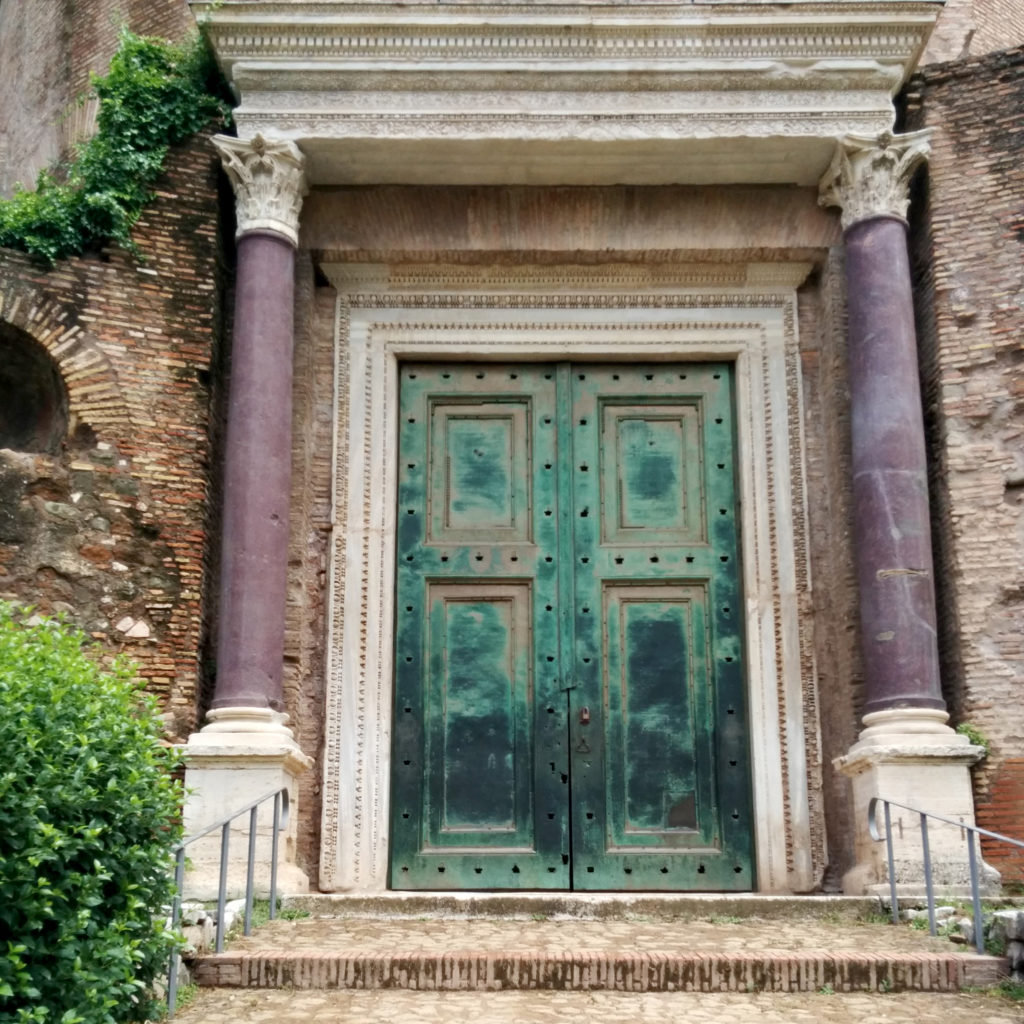[Greek] θύρα (thyra), [Latin] foris, [Old English] dor: door, entrance, gate portal; Mt.6:6, Mt. 24:33, Mt.25:10, Mt.27:60, Mt. 28:2, Mk.1:33, Mk.2:2, Mk.11:4, Mk.13:29, Mk.15:46, Mk.16:3, Lk.11:7, Lk.13:25, Jn.10:1,2,7,9, Jn.18:16, Jn.20:19:26, Act: 3:2, Act:5:19,23, Act 12:6,13, Act 14:27, Act 16:26,27, Act 21:30

The original door (thyra) of the Temple of Divus Romulus (built in the 4th century A.D)
Background Information:
Greek Hellenism: This term is used both in a literal and figurative sense. The figurative sense provides a spatial image to denote time. In Greek literature, this term is found in epiphanies, doors, miracles of liberation, freeing of chains, and belief in prodigies. The Greek myths speak of the freeing of the gods and the opening of prison doors. Homer’s Odyssey makes references to an ancient precursor of securing and releasing doors. This term was commonly found in the plural form, referencing two doors at the front entrance of a residence or temple building. The singular refers to a folding door. A bolt (bar) was typically used to secure the door. The means to bolt (lock) or unbolt (unlock) was accomplished by the pulling of a leather thong (cord) which was inserted through a hole in the door. A loop, ring, or hook was used to pull or release the thong. Homer’s Odyssey 1.442 states, “She draws the door to by its silver handle, and driving the bolt home with the thong.” The bolt becomes a precursor to the key.
Old Testament: This term can mean door, gate, entrance, something swinging, and window. In a figurative sense, the door speaks of both God and man opening doors. The man opens the door to God by repenting. God opens the door to man by giving him opportunities for intercession, repentance, and grace. This term has a missionary sense. God opens a door for an opportunity for the missionary. God opens a door of faith to those who come to believe. Uriah slept at the entrance of the royal palace with the officers (2Sam.11:9). The Ammonites came out and drew up in battle formation at the entrance of the city gate (2Sam. 10:8). The revelation of your words sheds light, gives understanding to the simple (Psa. 119:130). Lot went out to meet them at the entrance (Gen.19:6). Go, my people, enter your chambers (Isa.26:20). All the cities were fortified with high walls and gates (Deut.3:5). Each door had two movable leaves (Ezek. 41:24). And who shut within doors the sea, when it burst forth from the womb (Job 38:8). This is nothing else but an abode of God, and that is the gateway to heaven (Gen.28:17).
New Testament: This term is also used in a literal and figurative sense. Literal examples include the house door, outer-door (leading into the courtyard), the door of a walled in area (field), temple gate, inner court gate, and tomb entrance. The figurative examples include the door of heaven which controls access to heaven and Jesus. Door miracles, occurring in Acts, make reference to earthquakes, liberation at night, falling off of chains, and the bursting open of doors. Jesus, the Good Shepherd, is the gate (door) to the sheep. This sheep imagery, coming from the Old Testament, points to Jesus as the Messianic mediator, the way (and the truth and the light), and as the one who allows one to come to the father.
Scripture:
“So Jesus said to them again, ‘Truly, truly, I say to you, I am the door of the sheep.’” Jn.10:7
Jesus is the Good Shepherd leading His sheep. When Jesus says, ‘Truly, truly…”, Jesus means to say something very important.
“Strive to enter through the narrow door, for many, I tell you, will seek to enter and will not be able.” Lk.13:24
The narrow door may offer a difficult. Not many will be able to enter
“But during the night the angel of the Lord opened the gates of the prison.” Acts 5:19
The God (through the angel) provided a door (opening) of freedom.
Thyroid: This is an endocrine gland located in the front of the neck (throat). This gland regulates the metabolic processes in the body. The etymology of thyroid comes from thyreos which means oblong door- shaped shield. The thyroid gland was first coined in 1840
Conclusion:
Thyroid, door, forest, forum, foreign
Perhaps it is not surprising that this term has been used in both a literal and figurative throughout all history. In a figurative sense, continual and consistent themes of liberation and freedom occur with this term. In a sense, a door is like a shield in providing security and protection from unwanted guests and enemies. It is interesting to note there existed a crude means to lock and unlock the door with the use of a cord (thong). This becomes an early precursor to the door lock.
It is significant that a door is used to illustrate the relationship between God and man. The door can provide access (or closure) to grace, salvation, and missionary work. Doors and gates provide an important role in providing access to temples and courts.
The miracle door stories in Acts contain themes of liberation from bondage. They emphasize that God can overcome these human obstacles. Besides being the Good Shepherd, Jesus is also considered the gate (door) to the sheep. This imagery illustrates that Jesus guides and becomes the way man knows about the Father in heaven.
The terms forest and foreign are essentially similar in meaning. Forest means the geography (woods) out of the door (foris). Forestis silva means outside woods. Therefore, Pennsylvania means Penn’s woods. Foreign is also outside or out of doors. The Roman Form was an outside enclosure surrounding a house. The Forum was a public area for commercial, religious, social, political activities in the community.
It’s time to for me to leave now. I will make sure to close the door on my way out.
